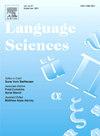历史汉语与现代汉语的谦虚差异:谦虚元语言学的计算分析
IF 1.1
2区 文学
Q2 EDUCATION & EDUCATIONAL RESEARCH
引用次数: 0
摘要
无论是在东亚语言的研究中,还是在东西方比较中,谦逊经常被认为是受儒家影响的“东方”所持有的传统价值观。然而,用传统来解释现代言语行为提出了一个问题,即对谦虚的理解是否随着时间的推移而保持不变。本研究探讨了历史和现代汉语中谦虚的元语言,揭示了它的理解到底继承了什么,又发生了什么变化。本文采用两种计算方法,结合定性分析,对汉语谦序和谦寻的语料库数据进行了检验。研究结果表明,随着时间的推移,谦虚仍然是一种美德,也是一种抽象的人际交往策略。然而,在中国历史上曾经仪式化的对等和重复的谦虚做法,在现代中国基本上已经停止了。自我淡化具有不同的社会实用功能,注意回避行为越来越多地与谦虚联系在一起。更重要的是,现代汉语中的谦虚已经与历史汉语中没有的社会品质和实践相结合。这种变化反映了中国政治宣传的影响。本文章由计算机程序翻译,如有差异,请以英文原文为准。
Modesty differs between historical and modern Chinese: A computational analysis of modesty metalinguistics
Whether in studies of East Asian languages or in East-West comparisons, modesty has frequently been regarded as a traditional value held by the Confucianism-influenced ‘East’. However, using the tradition to explain modern speech behaviours raises the question of whether the understanding of modesty has remained the same over time. This study explores the metalanguage of modesty in historical and modern Chinese, to reveal what has indeed been inherited and what has changed in its understanding. It employs two computational methods, together with qualitative analysis, to examine corpus data where Chinese modesty lexemes, qianxu and qianxun, are used. Findings show that modesty remains to be a virtue and an interpersonal tactic at the abstract level over time. However, reciprocal and repeated practices of modesty, which were once ritualized in historical Chinese, largely ceased in modern Chinese. Self-effacement serves different sociopragmatic functions, and attention-avoidance behaviours are increasingly associated with modesty nowadays. More importantly, modesty in modern Chinese has been patterned with social qualities and practices that have not been identified in historical Chinese. The change reflects an influence of political propaganda in China.
求助全文
通过发布文献求助,成功后即可免费获取论文全文。
去求助
来源期刊

Language Sciences
Multiple-
CiteScore
2.90
自引率
0.00%
发文量
38
期刊介绍:
Language Sciences is a forum for debate, conducted so as to be of interest to the widest possible audience, on conceptual and theoretical issues in the various branches of general linguistics. The journal is also concerned with bringing to linguists attention current thinking about language within disciplines other than linguistics itself; relevant contributions from anthropologists, philosophers, psychologists and sociologists, among others, will be warmly received. In addition, the Editor is particularly keen to encourage the submission of essays on topics in the history and philosophy of language studies, and review articles discussing the import of significant recent works on language and linguistics.
 求助内容:
求助内容: 应助结果提醒方式:
应助结果提醒方式:


